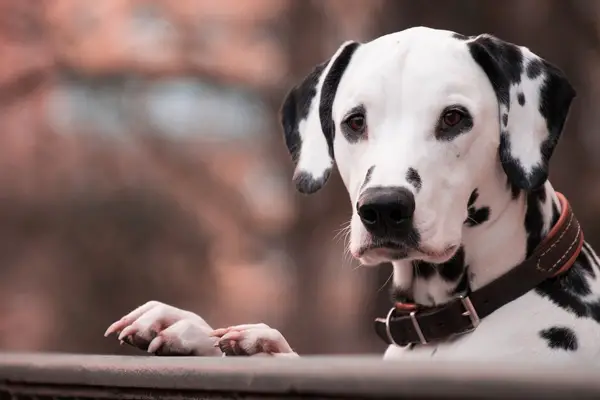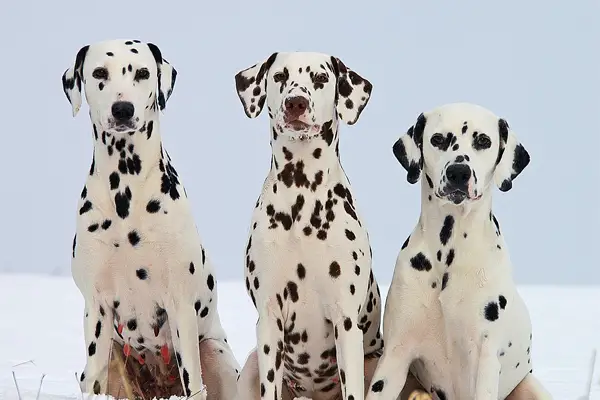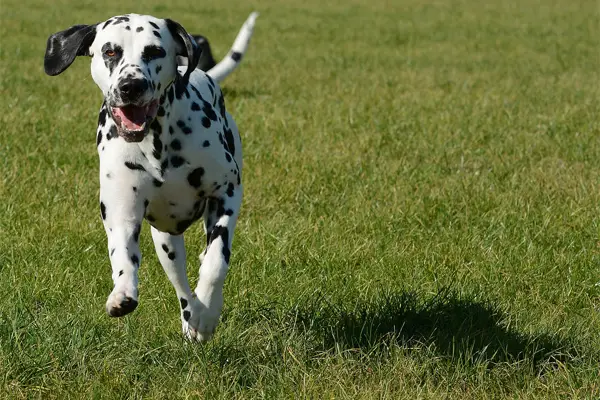Dalmatians are medium-sized dogs most known for the movie 101 Dalmatians. The Dalmatian has a sleek and muscular body, covered with eye-catching black or liver spots. They were originally bred to guard horses and coaches, which explains their boundless stamina and energy. They make great companions for those who love jogging, skating, or biking.

Dalmatian Statistics
| Dog Breed Group | Non-Sporting |
| Breed Size | Medium to Large |
| Height | 19-24 inches |
| Weight | 45-70 pounds |
| Lifespan | 11-13 years |
Dalmatian Ratings
| Energy level | |
| Exercise needs | |
| Requires attention | |
| Playfulness | |
| Trainability | |
| Shedding | |
| Grooming | |
| Friendly with family | |
| Friendly with kids | |
| Friendly with strangers | |
| Friendly with other dogs | |
| Prey Drive |
Dalmatian History
The Dalmatian’s origin is still unclear though many believed that they had traveled with nomadic bands. They are said to have been first spotted in a place called Dalmatia, where they have gotten their name.
They have been used as working dogs for several jobs – guard dogs, shepherds, ratters, retrievers, circus dogs, and most especially, coaching dogs. In fact, they are the only dog breed training for coaching.
They spent most of their coaching career in England. They will trot down beside horse-drawn carriages and guard the horses when the carriage is unattached. They also walked alongside caravans.
The English men referred to them as the English Coach Dog, Spotted Dick, and the Plum Pudding Dog. In the 1800s, the Dalmatians started to be associated with firefighters, and they have been doing it until this day.
The American Kennel Club registered the dog breed in 1988. And they’re still the only dog breed known for their coaching ability.

Dalmatian Temperament
Dalmatians are dignified dogs who are smart and outgoing. They have high energy for play, and they can also be very sensitive.
This dog breed is loyal to his family, and he is exceptionally good with children. He desires attention, and he needs a home that will be able to give him the human companionship he needed.
Their temperament varies with other people. Some are happily greeting strangers, while others have this protective instinct kicking in. They are friendly with other pets, but they most especially love horses.
As highly energetic dogs, the Dalmatian needs plenty of exercise to keep him busy. If left alone or bored, his behavior becomes destructive.
Training and early socialization are essential for these dogs, especially if you want them to become well-rounded. You also need some huge amount of patience in training them as they tend to be independent.
Dalmatian Care Requirements
- Nutrition: In keeping your Dalmatians healthy, home-cooked meals are your best course. Dalmatians are the only dog breed that lacks an enzyme that can help digest proteins, which means having a lot of protein can be dangerous. However, you can’t cut it down too because they need it for their high energy. To prepare the right food, it’s always best to use high-quality ingredients and avoid chemical and artificial preservatives. They need food with low purine content, moderate in high-quality proteins, high in complex carbohydrates, low in fat and fillers, and most especially, low in salt. This helps keep their urine in check and avoid stones. It’s best if you ask a vegetarian’s advice on the best food combination for your own Dalmatian as there are also allergies that you need to deal with. This way, you can assure that you’re only giving him the best.
- Grooming: Although the Dalmatian’s coat is a delight to see, the frequent shedding can be frustrating to those who own this dog. They need plenty of brushing if you don’t want those hairs all over your floor and furniture. You can give occasional baths to keep this dog looking his best. But ears should be cleaned regularly to avoid any ear infection. Pay attention to their nails and always keep them short so you’re Dalmatian stays comfortable.
- Exercise: Dalmatians need a considerable amount of activity if you want them to stay healthy and happy. This will include running around your backyard, biking or jogging alongside you )because they sure can keep up), or hiking. This is highly important to do every day, as these dogs should not get bored. If they do, you’ll have to say goodbye to that neat arrangement of your house.
- Health: Stone in the Urinary Tract is one of the most common health problems in Dalmatians. This is because of their unique uric acid metabolism, which makes them very sensitive to food. So, it would be best if you are extra careful of what you feed them. Other than this, Dalmatians are also prone to allergies, skin conditions, eye problems, and laryngeal paralysis. Some of these diseases don’t come with screening tests for early detection, so it’s crucial to be aware of specific symptoms. This way, if there are certain changes in their behavior, you get to take them for a check-up immediately.
- Lifespan: The life expectancy of Dalmatians is 11-13 years.

Famous Dalmatians
- Chip, Brewer, and Clyde: Budweiser Dalmatian dogs
- Madame Moose: The Dalmatian Dog of George Washington
- Lucile: The Dalmatian of Dick Clark
- Slugger: The Dalmatian of the baseball player Ted Williams
Fun Facts About Dalmatians
- The origin of Dalmatian dogs is unsure, but they’re believed to have been around for centuries.
- Dalmatians are the only dog breed bred for “coaching”; coaching means running alongside a stagecoach and clearing crowds out of the way.
- They are famous as firehouse dogs.
- Dalmatians don’t have black spots when they’re born.
- No two Dalmatians have the same spot pattern.
- They have been called many names such as English Coach Dog, Carriage Dog, Plum Pudding Dog, Firehouse Dog, and Spotted Dog.
- The movie 101 Dalmatians have done some damage to the breed; due to popularity, many people purchased the dog unprepared for the responsibility.
Check Out Other Non-Sporting Dog Breeds:
American Eskimo Dog, Bichons Frises, Boston Terrier, Bulldog, Chinese Shar-Pei, Chow Chow, Coton de Tulear, Finnish Spitz, Keeshonden, Lhasa Apsos, Lowchen, Norwegian Lundehund, Schipperkes, Shiba Inu, Tibetan Spaniel, Tibetan Terrier, Xoloitzcuintli
